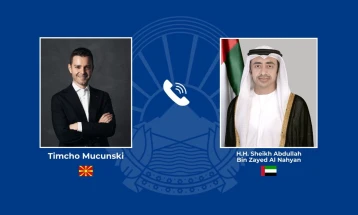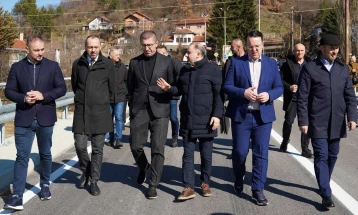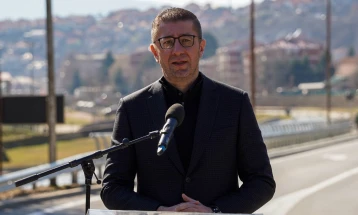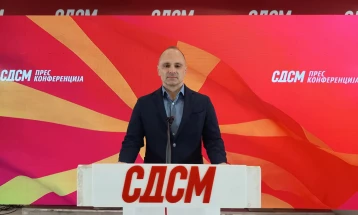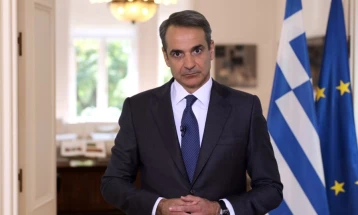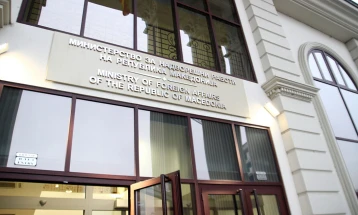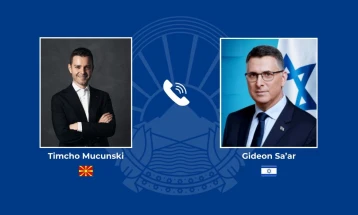North Macedonia starts plans to introduce European Child Guarantee
- UNICEF Representative Patrizia DiGiovanni opening remarks at an event to discuss the implementation of the European Child Guarantee in North Macedonia
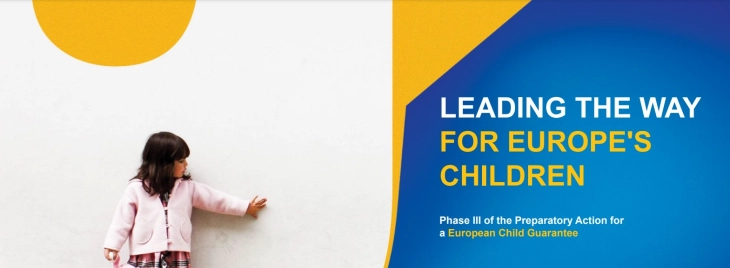
29 January 2024
UNICEF Representative Patrizia DiGiovanni opening remarks at an event to discuss the implementation of the European Child Guarantee in North Macedonia
Skopje - “I would like to start off with sharing some data and information that makes evident, why we need a mechanism such as the European Child Guarantee. A UNICEF study showed that 12 per cent of children aged 5 to 17 and 9 per cent of children under 5 in North Macedonia experience multidimensional poverty. The multidimensional child poverty study was the first one in the Western Balkan, using the most globally acclaimed methodological approach in this domain. Deprivations in education, early child development, health and nutrition, safety, and love and care are among the top five contributors to child poverty, signalling areas where improvement in public finance allocations and service delivery are most needed.
Roma children are significantly more vulnerable – at least one in three Roma children experience multidimensional poverty, compared to one in nine children in the overall population. While we were developing the profile of most-at-risk children, we also identified the geographically most vulnerable communities in terms of multidimensional child poverty. Two regions, the East and the Southeast, have the highest prevalence of multidimensional poverty, and the Polog and Skopje regions also show high vulnerability.
Children facing poverty and/or exclusion face greater barriers to accessing services and to receiving support they need, as the systems are not oriented to serve these children – to systematically identify them and their needs, reach out to them, link them up to mainstream services, and track them throughout the system. These children are not reaching their full potential.
Access to healthcare is challenging as more than 21,000 children in the country do not have health insurance, and even insured children from low-income households are not eligible for exemptions from co-payments for outpatient medicines and medical products. Effectiveness of maternal and child health care programs, as well as of childhood vaccinations could be greatly enhanced.
While access to primary education is free of charge in North Macedonia, the authorities are yet to ensure a free school meal for all students, despite the commitment to increase the time children spend each day in school-based activities. Furthermore, the costs of extracurricular activities are only partially covered by the municipalities, leaving children from poorer families unable to fully engage in extracurricular activities including those on experiential learning, art and sports. The concluding observations of the Committee on the Rights of the Child (CRC) for North Macedonia released in 2022 recommended that the authorities should continue to strengthen basic social services at the local level and prioritise social service delivery according to the needs of children in vulnerable situations, in particular Roma children, refugee and asylum-seeking children, and children from families facing poverty, disability, social exclusion and stigma.
The EU country report notes that further efforts are needed to make the social protection system more child-sensitive based on a child-centered service delivery model, including by strengthening professional development and supervision in the delivery of good quality child protection services. Simultaneously, the CRC calls to prioritize reforms of the child protection system including by replacing small group homes in favour of family placement, as well as by further strengthening the foster care system. Measures to eradicate child marriages and raise awareness on the negative impacts of such harmful traditional practices on children, particularly among Roma population, remain inefficient.
The abovementioned challenges require a systemic approach to ensure that vulnerable children have effective access to basic social services, the most disadvantaged ones receive universal, targeted or specialised services, and that these services are appropriate and acceptable to children and their care givers and are provided in a non-stigmatizing and non-discriminatory way.
The European Child Guarantee is a key EU action to fight poverty, promote inclusive and child-friendly societies, health, protection and education systems.
The UNICEF Regional Office for Europe and Central Asia and the European Commission have an ongoing partnership to pilot the European Child Guarantee across seven Member States: Bulgaria, Croatia, Germany, Greece, Italy, Lithuania, and Spain.
We encourage you to utilize the knowledge and experience generated through this partnership to support the introduction of the European Child Guarantee in North Macedonia. While this may seem like an ambitious task, I have to say that one of the advantages of this country on such a reform path is that you have the legacy of a system that had the hallmarks of a welfare state, delivering an extraordinary range of universal and free of charge basic social services.
UNICEF is working with the Ministry of Labour and Social Policy (MoLSP), as well as line ministries of education and health to ensure the protection of rights of all children and secure systemic access to basic services for vulnerable children with the implementation of the European Child Guarantee.
“While we are fortunate in this country that we have the legacy of a system that had the hallmarks of a welfare state, which delivered an extraordinary range of universal and free of charge basic social services. UNICEF is supporting the intersectoral working group that is preparing the National Action Plan on Child Rights, to develop measures for the implementation of the Guarantee.
“The implementation of the Child Guarantee in North Macedonia will put in place both universal and targeted interventions to provide social protection, education and healthcare to the most vulnerable children, including children in the streets, children forced into early marriages, children affected by migration, both statutory and community-based, depending on the specific context of the child and the family.
“It will also assist national and local authorities to strengthen public financial management with regard to better planning, budgeting and executing the budget with relation to basic social services for vulnerable children – in the sphere of child/social protection, healthcare and education. This will ensure, that gradually, every child, will have access to quality education, healthcare, welfare and protection. That’s every child will be able to reach their full potential.
More information on the European Child Guarantee:
Poverty and social exclusion have a major impact on children's lives, preventing them from accessing basic services such as health care, education, childcare, quality housing. Children facing poverty and/or exclusion face greater barriers to accessing services, because systems are not geared towards serving these children - systematically identifying them and their needs, reaching out to them, connecting them with basic services and monitor them throughout the system.
The European Child Guarantee is an EU mechanism to prevent social exclusion of children in need by guaranteeing access to a range of key basic social services. The child guarantee aims to ensure that vulnerable children have access to quality services, that is, to determine minimum packages of services for each group of the most vulnerable children. The guarantee, which has already been implemented in several countries in Europe, introduces innovative approaches to national budgeting, planning and development of national action plans to reduce child poverty and to tackle systematic disadvantages for particularly vulnerable children. It aims to provide effective access to basic social services for vulnerable children, as well as targeted and specialized services appropriate and acceptable to children and their guardians, in a non-stigmatizing and non-discriminatory manner.
UNICEF
